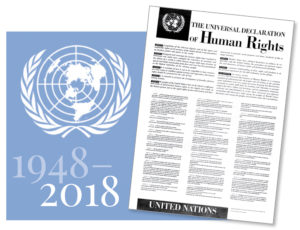The Universal Declaration of Human Rights Turns Seventy

This year marks the seventieth anniversary of the Universal Declaration of Human Rights (UDHR), proclaimed by the United Nations General Assembly in Paris, France, on December 10, 1948, as General Assembly Resolution 217A and translated into more than 500 languages worldwide. The UDHR was carefully drafted by various representatives with different legal and cultural backgrounds from all known regions of the world, setting out, for the first time in human history, fundamental human rights to be universally protected by international and domestic governments as well as intergovernmental organizations.
Created by members of the United Nations’ Commission on Human Rights, representatives such as René Cassin of France, Eleanor Roosevelt of the United States, Charles Malik of Lebanon, John Humphrey of Canada, and Peng Chung Chang of China were among the primary drafters of this important document. While many of these diplomats came from Jewish, Christian, and Eastern religious backgrounds, the document they formed exemplifies a secular humanist ideal regarding a common universality and intersectionality of humanity and progress. From protecting freedom of thought and opinion to freedom from slavery, torture, and unjust arrest, these ideals have shaped human rights and civil liberty protections in democratically governed nations in developed and developing parts of the world. The document itself has major influences from the English Magna Carta, the US Declaration of Independence and Constitution, the Iranian Cyrus Charter, the English Bill of Rights, the US Bill of Rights, and the French Declaration of the Rights of the Man and of the Citizen. The declaration also addresses critical socioeconomic rights being fought for today, such as the rights to healthcare and an education.
However, despite the fact that forty-eight member states voted for the resolution’s adoption, the rights set forth in the UDHR have not been secured for a great many all over the world. Specifically in regards to protecting minority religious groups and the nonreligious from persecution, discrimination, and other forms of suppression or oppression, the global community still has far to go.
According to the 2017 Freedom of Thought Report, a global research project published by the International Humanist and Ethical Union (IHEU), countries listed as the worst places in the world to be a nonreligious nonbeliever include China, Indonesia, Saudi Arabia, Iran, Pakistan, Somalia, and Sudan. Various factors that go into measuring human rights abuses against non-theists include the relationship between religious organizations and the state, the status of freedom of expression and opinion, societal traditions as well as customs, and the use or nonuse of religious courts. In the report, the gravest violations have come from predominantly Muslim countries in the Middle East, South Asia, and Northern Africa, as well as from East Asia, where China and North Korea suppress numerous religious groups.
While these countries have a way to go in ensuring the human rights and civil liberties of their citizens, including nonreligious citizens, developed countries like the United States also have issues regarding the treatment of nonreligious people. Indeed, every time politicians in Washington propose prioritizing Christian and Jewish refugees over Muslim refugees from the Middle East, no one mentions taking in nonreligious asylum seekers fleeing violence, death, or other forms of persecution from countries like Iran, Saudi Arabia, Pakistan, and Afghanistan. While it’s important to protect any foreign nationals from any type of religious persecution, the US must commit to equal protections for those fleeing anti-secular violence or suppression. Notably, in September US Senators James Lankford (R-OK) and Chris Coons (D-DE) worked with the American Humanist Association to introduce a resolution opposing blasphemy laws around the world.
Such efforts, along with documents like the Universal Declaration of Human Rights, are critical in upholding and defending the humanist ideals of freedom of individual thought, opinion, and expression. As greatly penned in Article 19,
Everyone has the right to freedom of opinion and expression; this right includes freedom to hold opinions without interference and to seek, receive, and impart information and ideas through any media and regardless of frontiers.
With guiding documents like the UDHR, progress and commitment towards universal human rights continues as rates of illiteracy, genocide, mass killings, war and conflict-related death, rape, sexual assault have slowly gone down since the mid-late twentieth century. Furthermore, there’s been more decriminalization of homosexuality and democratization of governments. However, illiberal forces continue to gain momentum with President Donald Trump’s economic protectionism and xenophobia, nativism throughout Europe, and nationalist buildup in China as well as India.
Humanists must show solidarity in acting to uphold the Universal Declaration of Human Rights and continually define and protect human rights and civil liberties for all people.
